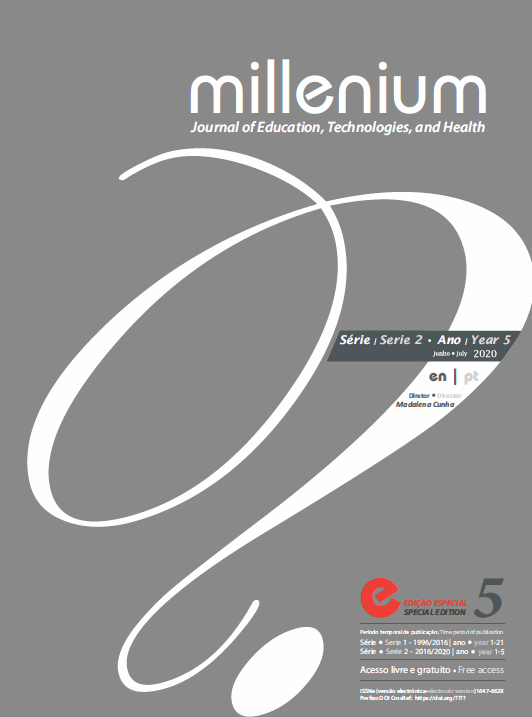Influence factors in self-care in people with rheumatoid arthritis
integrative literature review
DOI:
https://doi.org/10.29352/mill0205e.31.00340Keywords:
rheumatoid arthritis, self-care, self-managementAbstract
Introduction: Self-care and self-management are part of daily life and involve intentional activities to prevent or limit diseases and slow their progression (Barley 2016; Jones et al, 2011). The self-management / self-care capacity of people with RA can be influenced by multiple factors, from beliefs about medication, which can influence adherence, to external factors, such as lack of access to certain health care.
Objectives: To identify the factors that influence self-care in people with RA.
Methods: Integrative literature review. in the main databases. The critical evaluation, extraction and synthesis of data were performed by two independent reviewers.
Results: 12 studies were included, of which emerged as factors influencing self-care, factors related to: social support, emotional, socioeconomic and cultural support, illness and comorbidities, health services and professionals, treatment, knowledge, intrinsic to the person and physical barriers.
Conclusions: the knowledge of the categories identified in the present study is useful in the development of programs that try to reduce barriers and increase reinforcement factors, with a view to improving and developing self-care behaviours.
Downloads
References
Barley, E., & Lawson, V. (2016). Health psychology: supporting the self-management of long-term conditions. Br J Nurs, 25(20), 1102-1107. DOI: 10.12968/bjon.2016.25.20.1102
Branco, J., Faustino, A., Carvalho, B., Araújo, F., Canhão, H., Brito, I., & Costa, M. M. (2015). Rede Nacional de Especialidade Hospitalar e de Referenciação de Reumatologia.
Cunha, M., Ribeiro, A., & André, S. (2016). Anxiety, Depression and Stress in Patients with Rheumatoid Arthritis. Procedia - Social and Behavioral Sciences, 217, 337-343. DOI: https://doi.org/10.1016/j.sbspro.2016.02.098
EULAR. (2015). Textbook on Rheumatic Diseases (2nd edition ed.). Switzerland.
Hong, Q. N., Gonzalez-Reyes, A., & Pluye, P. (2018). Improving the usefulness of a tool for appraising the quality of qualitative, quantitative and mixed methods studies, the Mixed Methods Appraisal Tool (MMAT). J Eval Clin Pract, 24(3), 459-467. DOI: 10.1111/jep.12884
Larkin, L., Kennedy, N., Fraser, A., & Gallagher, S. (2017). 'It might hurt, but still it's good': People with rheumatoid arthritis beliefs and expectations about physical activity interventions. J Health Psychol, 22(13), 1678-1690. DOI: 10.1177/1359105316633286
Pedraz-Marcos, A., Palmar-Santos, A. M., Hale, C. A., Zarco-Colón, J., Ramasco-Gutiérrez, M., García-Perea, E., & Sapena-Fortea, N. (2018). Living With Rheumatoid Arthritis in Spain: A Qualitative Study of Patient Experience and the Role of Health Professionals. Clinical nursing research, 1054773818791096. DOI: 10.1177/1054773818791096
Rocha, A. I. A. R. F. (2015). Ansiedade, depressão e stress em pessoas com artrite reumatóide. (Mestrado em Enfermagem Comunitária). Acedido em http://hdl.handle.net/10400.19/2835
Smolen, J. S., Landewé, R. B. M., Bijlsma, J. W. J., Burmester, G. R., Dougados, M., Kerschbaumer, A., & van der Heijde, D. (2020). EULAR recommendations for the management of rheumatoid arthritis with synthetic and biological disease-modifying antirheumatic drugs: 2019 update. Ann Rheum Dis, annrheumdis-2019-216655. DOI: 10.1136/annrheumdis-2019-216655
Sousa, F., Santos, E., Cunha, M., Ferreira, R., & Marques, A. (2017). Effectiveness of nursing consultations in people with rheumatoid arthritis: systematic review. Revista de Enfermagem Referência, IV Série, 147-156. DOI: 10.12707/RIV17013
Whittemore, R., & Knafl, K. (2005). The integrative review: updated methodology. Journal of Advanced Nursing, 52(5), 546-553. DOI: 10.1111/j.1365-2648.2005.03621.x
Zangi, H. A., Ndosi, M., Adams, J., Andersen, L., Bode, C., Boström, C., & Gossec, L. (2015). EULAR recommendations for patient education for people with inflammatory arthritis. 74(6), 954-962. DOI: 10.1136/annrheumdis-2014-206807
Downloads
Published
How to Cite
Issue
Section
License
Authors who submit proposals for this journal agree to the following terms:
a) Articles are published under the Licença Creative Commons (CC BY 4.0), in full open-access, without any cost or fees of any kind to the author or the reader;
b) The authors retain copyright and grant the journal right of first publication, allowing the free sharing of work, provided it is correctly attributed the authorship and initial publication in this journal;
c) The authors are permitted to take on additional contracts separately for non-exclusive distribution of the version of the work published in this journal (eg, post it to an institutional repository or as a book), with an acknowledgment of its initial publication in this journal;
d) Authors are permitted and encouraged to publish and distribute their work online (eg, in institutional repositories or on their website) as it can lead to productive exchanges, as well as increase the impact and citation of published work
Documents required for submission
Article template (Editable format)





